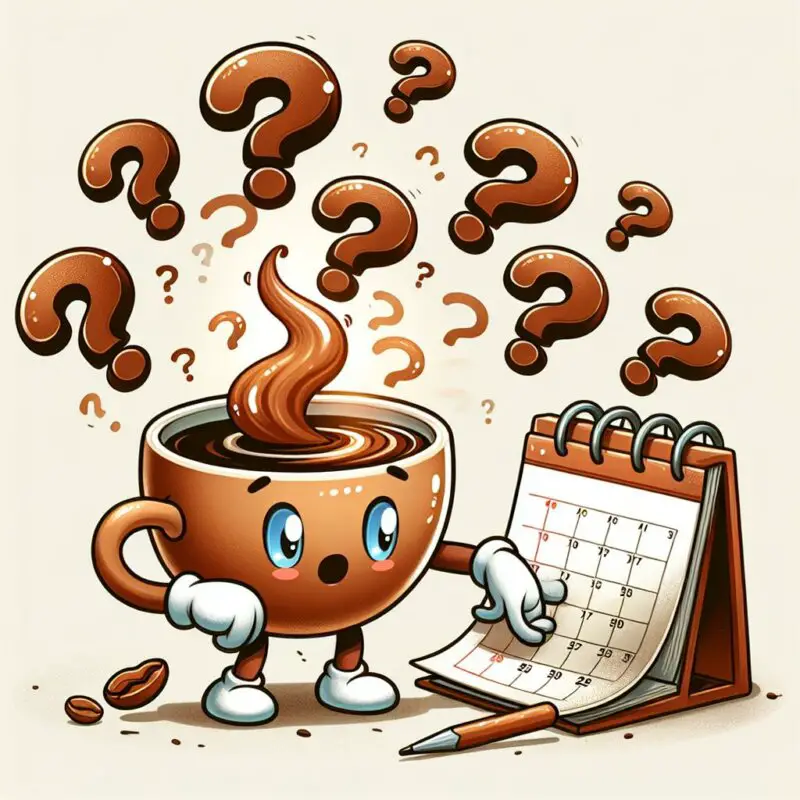This post may contain affiliate links. Please read my disclosure for more info.
Starting your day with coffee is a ritual for many. But what happens if that first sip makes you feel dizzy or lightheaded?
In this post, we’ll explore why coffee sometimes makes you dizzy and share tips on avoiding that feeling. Plus, I’ll guide you through shaking off dizziness if it hits after your coffee fix.
Why Does Coffee Make Me Dizzy?
Feeling a bit dizzy or lightheaded after your coffee fix? You’re not alone. This happens because caffeine can limit blood flow. It’s more common than you might guess!
Coffee beans have caffeine. How quickly your body breaks down caffeine from coffee doesn’t change with how much you drink. Each person handles it differently.
Caffeine makes your heart beat faster than normal and can also raise your blood pressure. It’s a common effect of this energizing stimulant.
If you find caffeine bothers you, you might not realize it’s causing symptoms. Common signs include:
- Inability to sleep
- Accelerated heartbeat
- Bouncing knee under the table
- Headaches
- Raised temperature (or a fluctuating one)
Can Caffeine Cause Lightheadedness?
Caffeine will cause lightheadedness in some people.
Coffee can give you a sugar rush, especially if you add lots of sweeteners. When sugar levels spike, you might feel dizzy and need to rest. Even though coffee beans have some natural sugars, it’s the extra sweet stuff we often pour in that makes the difference.
Caffeine boosts your blood flow quickly, which can play a role.
How to Prevent Coffee Dizziness
Avoid drinking coffee on an empty stomach
Always pair your morning coffee with food to protect your stomach.
Drinking coffee on an empty stomach can hurt because the caffeine makes your stomach produce acid. This can damage your stomach’s inside. To keep your tummy happy, always grab a bite before your coffee fix. Coffee fans, remember to eat first!
If you’ve been reaching for your coffee cup for years, remember, a hearty breakfast is key. Why? Coffee wakes you up because it blocks a brain signal called adenosine. Without getting too technical, your brain gets used to this over time, meaning you’ll crave more coffee for that same energizing effect. Click here to dive deeper into how it works.
As your body gets used to coffee, you might find yourself reaching for more cups each morning. But beware, this can lead to unwanted side effects like feeling dizzy. Drinking lots of coffee on an empty stomach? That’s a recipe for a rough start to your day.
Watch out for the jitters
Feeling jittery from coffee? It means caffeine is really kicking in. If you get shaky or anxious, it’s time to cut back on the caffeine. This can help you avoid feeling lightheaded or dizzy.
Be mindful of your sugar intake. Too much can spike your blood sugar, and when paired with caffeine, it might not be the best combo for your health.
Exercise regularly
Working out revs up your metabolism, helping your body handle caffeine faster. Just a few hours of aerobic exercise weekly can help you fend off caffeine’s side effects, like feeling dizzy.
Switch to decaf
Cutting down on caffeine? No worries! You can still enjoy coffee. Decaf tastes just as good and comes with plenty of health perks.
Decaf coffee often gets a bad rap, but it’s mostly due to the many low-quality options available. To find a good decaf, look for those labeled as Swiss Water decaf. This special process removes almost all the caffeine but keeps the delicious coffee flavor intact. Plus, it’s done without using any harsh chemicals, making it a great choice for coffee lovers.
5 Ways to Get Rid of Dizziness After Drinking Coffee
Feeling jittery from too much caffeine? Try these simple tricks to calm down.
1. Stop drinking coffee
Stop sipping on coffee for now. Caffeine sticks around for hours in your body. Drinking more just means waiting longer for the jittery feelings to fade.
Feeling dizzy? It might be time to pause your coffee intake for 10 hours or more, especially if caffeine hits you hard.
2. Skip other sources of caffeine, too
If caffeine makes you dizzy, remember it’s not just in coffee. Cut back on other foods and drinks that have caffeine too.
Did you know caffeine pops up in unexpected places? From chocolate and protein shakes to sodas and even some cereals! Always peek at the nutrition labels before you indulge. And hey, why not switch your Earl Grey for a calming herbal tea instead?
3. Drink some water
Drinking water keeps you hydrated, easing caffeine’s side effects. It also helps your body process caffeine quicker, letting you enjoy your coffee habit with fewer downsides. Stay hydrated for a smoother coffee experience!
Watch out for sports drinks and other substitutes for water. They often contain additives aimed at boosting performance, which isn’t what you need at the moment.
4. Try deep breathing exercises
Too much caffeine can make your heart race and cause palpitations.
Feeling jittery from too much coffee? Take a deep breath, or better yet, meditate. These simple steps can soothe your mind and body, signaling it’s time to relax. Though it won’t erase all the caffeine jitters or dizziness, it can definitely make them more manageable. Give it a try!
5. Boost your vitamin D intake
Caffeine can slow down how your body absorbs vitamin D. Watch out, as this might lead to a deficiency if you’re not mindful.
Spending just 25 minutes in the sun each day can give you all the vitamin D you need. Plus, it’s a great chance to pair it with some outdoor exercise!
What’s Next?
Don’t think about quitting coffee just yet! Besides its irresistible taste, coffee is packed with potassium and other good stuff for your body. The trick is to find the right coffee drinks that fit your caffeine needs. Steer clear of high-caffeine options and some of the potent Starbucks picks to keep things balanced.
Looking to enjoy just one perfect cup of coffee without making too much? Single-serve coffee makers are your best bet. Consider trying a Nespresso Vertuo machine. My top pick is the Nespresso VertuoPlus Deluxe for its ease and quality in brewing both espresso and coffee. Plus, I’ve put together a handy chart detailing the caffeine content in Nespresso pods to guide you.




